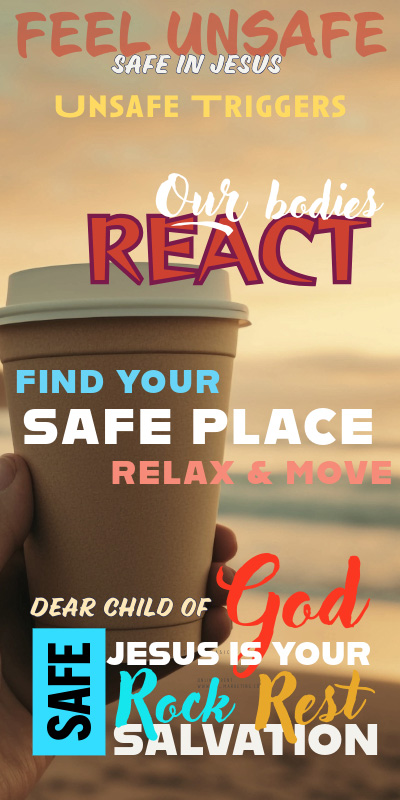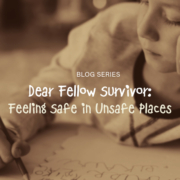Dear Fellow Survivor Blog: Feeling Safe in Unsafe Places
Summary
This is a blog post series by the author who wrote the devotion series "Dear Survivor". Follow along as he blogs about the background of his experience on his continued journey of healing.
Dear fellow survivor,
Do you have a “happy place,” where you feel especially happy, safe, and secure? I can’t pick just one place as my happy place. Many places help me feel safe and secure. The beach is one of my happy places. Few things relax me quite like sitting on the beach, listening to the waves, and feeling the sand beneath my feet. The kitchen is another of my happy places. I find great joy in cooking and feel especially fulfilled when my wife tells me how much she enjoys whatever I’ve prepared for dinner. Interestingly, I’ve recently added a Panera café to my list of happy places. I’ve discovered that I do much better mentally and emotionally when I’m not working alone in my office. So, I’ve begun working at a local Panera several days a week. That allows me to work while surrounded by other people, which helps me focus and feel more secure in my thoughts.

It would be nice if we could spend all our time only in our happy places. Life, however, doesn’t work that way. Sometimes we find ourselves in places where, for whatever reason, we don’t feel safe and secure. I experienced this last month when I attended a training seminar at the seminary I graduated from over 27 years ago.
This was the second year in a row that I’ve attended this seminar. Last year, I experienced a significant emotional breakdown while I was there, and that breakdown continued for several weeks after I returned home. The degree to which being at the seminary affected me surprised me. I had previously thought of the seminary as a happy place. So, the distress I felt in my body, the intensity of my emotions, and the duration of the emotional spiral that I fell into shocked and troubled me.
What was going on? Why did I feel so unsafe in a place that seemingly should give me every reason to feel safe?In the year since that experience, my therapist has helped me realize why my body and mind reacted as they did to being at the seminary. Nothing bad had happened to me there. No one had abused me. No one had hurt me. In fact, many wonderful things happened there with friends I cherish to this day.
However, my time at the seminary was a time in which I still was unknowingly experiencing the effects of sexual abuse. As I sat in class with all my friends, my mind was consumed by thoughts about the size of their penises. As much as I cherished my friends and wanted to be around them, I subliminally felt threatened by them. I lived in a dorm for one year while I was at the seminary, and in that year, I shared a bedroom—and a shower room—with other guys.
When I got married after my first year at the seminary, I began to experience the effects of the sexual abuse in my relationship with my wife. Although I experienced no abuse while at the seminary, the effects of the abuse I experienced in my childhood were taking their toll on me. It was that that my mind and body were reacting to so violently.
So this year, as I prepared to go back to the seminary, I foresaw the challenge and prepared accordingly. Last year, I had stayed in the dorm. Not this year. Instead, I planned to stay with relatives who lived nearby. I was not going to share a bedroom or a shower room with anyone else this year. I also practiced my relaxation techniques in preparation for anything that my body might do while I was there.
The first day of the seminar went well. I felt relaxed. I felt safe. But then the second day came. I took my seat in the front of the classroom as the session began. During the opening devotion, my body started tensing. My neck ached. My head throbbed. My heart raced. My breathing became shallow. I stayed where I was for a while, hoping that my body would soon calm down. But quickly I realized that I needed to get out of where I was. My body felt unsafe, and no amount of reasoning would convince it otherwise.
So, I got up from my chair and as calmly as I could walked to the back of the room. I didn’t want to step out of the room entirely (although I did step out for a little bit), because the presentation was about emotional resiliency for pastors, something I knew I needed and wanted to hear about. But even in the back of the room, I was able to do things to help my body feel safe. I closed my eyes and breathed deeply. I did knee bends. I paced quietly in the back of the room so as not to disturb the others who were there. I gently rolled my head around to help relax my neck. All those things helped immensely.
Reasoning with myself in that moment would have done nothing other than make me feel even worse about what my body was doing. The issue here wasn’t intellectual. It wasn’t about rationally explaining to myself all the reasons that I was safe. I needed to help my body experience safety despite what it was feeling at that moment. So that’s what I did. And I made it.
I don’t know if any other pastor attending that seminar understood what I was experiencing or why I was doing those things in the back of the classroom. I think you understand very well, dear fellow survivor, because you’ve had similar experiences.
I have a friend who fights panic attacks when they drive past the city where they grew up because of the abuse they experienced there. I have another friend who experiences overwhelming anger when interacting with a former employer because abusive behavior from a former coworker revives feelings of unsafety from abuse they experienced as a child. It doesn’t matter that they both know that they no longer are in danger of being abused. Their bodies feel unsafe when they drive past their hometown or when they interact with their former employer. When their bodies feel unsafe, their fight-or-flight reaction automatically kicks in. Once that is going, thoughts alone are insufficient to stop it.
But despite how we may feel in that moment, we are NOT powerless.
I’m sure you know that powerless feeling when you are in a triggering place and your body is desperately seeking safety. You know the muscle tension, the racing heartbeat, the shallow breaths, the ringing in the ears, the tremors in your hands, the dripping sweat, the nausea…you know it all. I do too. But despite how we may feel in that moment, we are NOT powerless. There are things we can do to help our bodies find safety.
First, we can be unashamed of the fact that we find certain places unsafe. Shame only increases our sense of danger, and an increased sense of danger is the last thing we need when we’re trying to feel safe. It doesn’t matter if no one else feels unsafe at the seminary. I do, and that’s OK. It makes sense given my experience. It doesn’t matter if most people feel nostalgia and not panic when they drive past their hometown. My friend feels panic, and that’s OK. It makes sense given their experience. It doesn’t matter that most people don’t feel seething rage when interacting with a former employer. My friend does, and that’s OK. It makes sense given their experience. And it doesn’t matter if no one else feels unsafe in your triggering place. You do, and that’s OK. It makes sense, given your experience. None of this is any reason for shame or embarrassment.
Next, we can understand that when our bodies are reacting to feelings of unsafety, they are doing what God designed them to do. Raised heart rate, shallow breathing, tense muscles, hyperawareness—all these things are useful when you’re trying to get out of danger. Are they comfortable? Not at all. Are they convenient? No. Do we wish they didn’t happen in places where we know intellectually that we’re not in danger? Absolutely. But until our bodies learn that they’re no longer in danger in that place, they will do what God designed them to do. They will prepare themselves for moving you to safety. That too is no reason for shame or embarrassment.
So, how can we help our bodies learn that they are safe, even in a place that formerly was not safe? Here it will help to understand how our minds and bodies work together. My therapist has helped me understand that God designed our body’s fight-or-flight response to be so quick that it kicks in faster than a conscious thought of danger can form in our minds. In other words, by the time we realize that we are in a potentially dangerous situation, our bodies already are reacting. Remember, that is by design and is extremely useful in situations where we truly are in danger. Because this fight-or-flight response is a physical response, not a conscious thought response, we won’t be able to think ourselves out of it. We have to do something physical to help our bodies feel safe so that they can let go of the fight-or-flight response and relax.
All this is why, when my body felt unsafe while I was at the seminary for that seminar, it helped to get up from my chair, walk to the back of the room, and move my body in ways that made it feel safe. Yes, I also told myself that I was safe. But the actions were far more important. Reason works well when our bodies are calm. Reason doesn’t work well at all when our bodies are in fight-or-flight mode. Before we can reason with ourselves, we need to help our bodies feel safe again. To feel safe, our bodies need to move. They need to feel. They need to experience. They can’t just think.
So, if you find yourself feeling unsafe in a place that you know intellectually is safe, don’t feel ashamed. Don’t be embarrassed. And don’t just tell yourself, “Stop it! You’re safe! You have no reason to react like this!” Instead, recognize that your body needs safety. Then help your body find that safety. Get up and move around. Leave the situation if you want to. Take deep breaths. Bend your knees. Move your arms. Roll your head around. Walk. Rock back and forth on your feet. Do whatever you want so that you can feel safe. Give your body time to relax. Then once your body does relax, keep moving. Keep breathing. Keep giving your body that experience of safety. Your body is experiencing a physical reaction to the danger it perceives. It needs a physical response to help it realize that, while it may feel as if it’s in danger, it truly is safe.
Remind yourself that no matter how you feel, you are safe in Jesus.
Finally, while you’re doing all these things, focus on the perfect safety that you have in Jesus. I know I’m listing this last, but that’s not because it’s less important than the actions I talked about earlier. It’s just that I know my own tendency to focus on thinking myself through things rather than giving my body the active physical response that it needs. So, I wanted to talk about the actions before returning to the thoughts. But as you’re moving, as you’re giving your body the active experience of safety that it needs, remind yourself that no matter how you feel, you are safe in Jesus. I like to use some verses from the Psalms.
The Lord is my rock, my fortress and my deliverer;
my God is my rock, in whom I take refuge,
my shield and the horn of my salvation, my stronghold. Psalm 18:2
The Lord is my light and my salvation—
whom shall I fear?
The Lord is the stronghold of my life—
of whom shall I be afraid? Psalm 27:1
Truly my soul finds rest in God;
my salvation comes from him.
Truly he is my rock and my salvation;
he is my fortress, I will never be shaken. Psalm 62:1-2
And then there’s all of Psalm 91, which ends in this way:
“Because he loves me,” says the Lord, “I will rescue him;
I will protect him, for he acknowledges my name.
He will call on me, and I will answer him;
I will be with him in trouble,
I will deliver him and honor him.
With long life I will satisfy him
and show him my salvation.” Psalm 91:14-16
By his death on the cross and his triumphant resurrection from the dead, Jesus has rescued you from the greatest dangers that could ever threaten you. He has rescued you from all your sins. He has neutralized death’s power to hold on to you forever. He has crushed Satan’s head and rendered all his accusations powerless.
You are safe, both now and forever.
I wish we could always remain in our happy places. But since we can’t, since we will find ourselves in places that feel dangerous to us, we can prepare for those situations, understand what is happening, and move our bodies to help them feel safe. In Jesus, we are safe. And he will keep us safe as we continue our journey to that eternal safe and happy place that he has prepared for us.
In Christ,
Your Brother Survivor
- Dear Fellow Survivor Blog: Feeling Safe in Unsafe Places
- Dear Fellow Survivor Blog: Healing from Hateful Words
- Dear Fellow Survivor Blog: Becoming Friends with Traumatized Me
- Dear Fellow Survivor Blog: Choose Joy
- Dear Fellow Survivor Blog: Not Powerless
- Dear Fellow Survivor Blog: Coming Out into the Real World
- Dear Fellow Survivor Blog: There’s No Google Maps for This
- Dear Fellow Survivor Blog: Living with a co-existing condition
- Dear Fellow Survivor Blog: The Gift of Vulnerability
- Dear Fellow Survivor Blog: Painful Puzzle Pieces
- Dear Fellow Survivor Blog: Leaning on my brothers
- Dear Fellow Survivor Blog: Sharing My Burden
- Dear Fellow Survivor Blog: About Me



